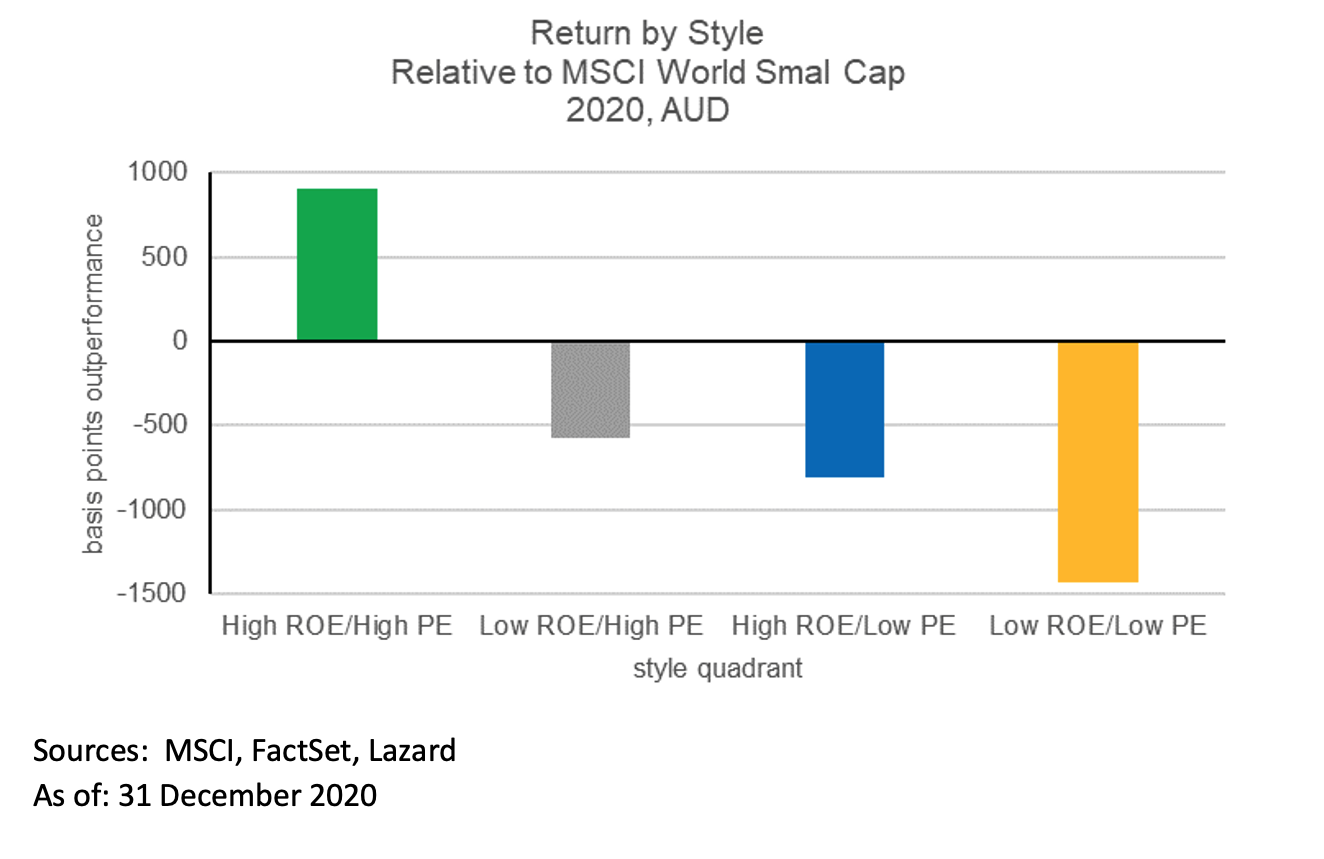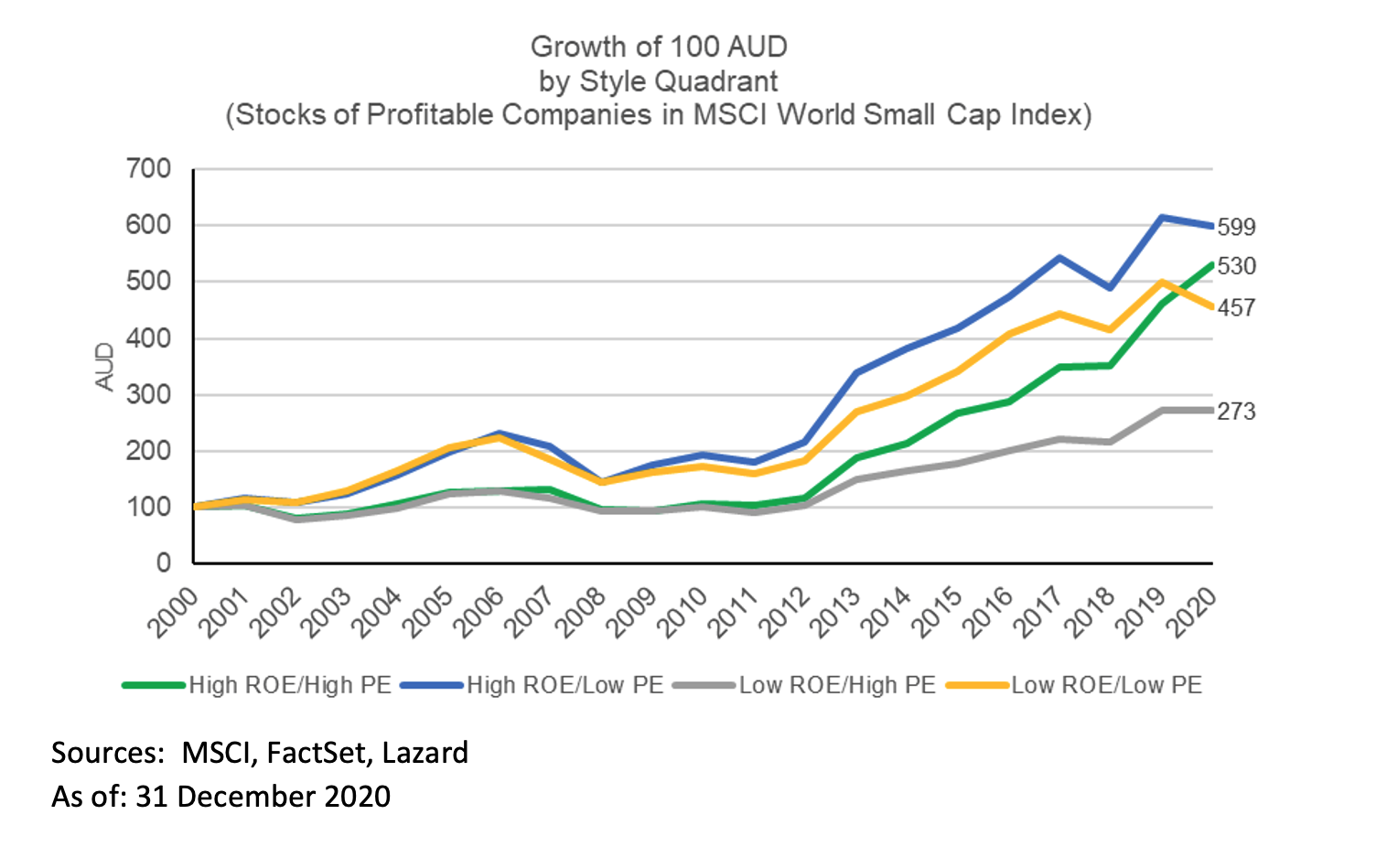How to find small-cap success and steer clear of “speccies”
Investing rulebooks went out the window last year, as pandemic-hit markets plummeted, then rebounded, and share prices rose or fell on little more than sentiment. Take buy-now-pay-later company Afterpay (ASX: APT), for example, whose market cap of $38 billion recently overtook that of ASX200 stalwart Telstra (ASX: TLS) – despite generating a fraction of the revenue.
As called out by one of the following respondents, this dynamic is particularly pronounced among small-cap stocks, some of which have had an “eye-popping” on overall market returns. Individual investors are struggling to get a handle on this phenomenon, and so are some of the most experienced fundies in the business.
In the following wire, our trio of global small-cap contributors explains how their process helps weed out potential failures and short-term hype.
Rosenfeld’s rule of 4
Edward Rosenfeld, portfolio manager, Lazard Asset Management
It’s a great question, particularly after a year that saw small-cap equities driven by some atypical factors.
One of the most eye-popping dynamics of 2020 was the impact that stocks of unprofitable companies had on market returns – especially in North America.
Overall, we estimate stocks of unprofitable companies in the MSCI World Small Cap Index outperformed by around 2,200 basis points (bps) during the year. Digging a bit deeper, we saw that this phenomenon was particularly acute in the information technology sector, where we estimate stocks of unprofitable companies led by a staggering 4,000 bps!
Meanwhile, among profitable companies, 2020 was a year in which it seemed the more expensive a stock, the better its performance – regardless of the quality of the underlying company.
We split profitable companies of MSCI World Small Cap Index into four quadrants to examine this dynamic – first by top and bottom half based on return-on-equity (ROE), and then within each of these halves by top and bottom half based on price-to-earnings (PE).
The result was style quadrants that represented companies characterised by either:
- High quality/expensive valuation (high ROE/high PE)
- High quality/cheap valuation (high ROE/low PE)
- Low quality/expensive valuation (low ROE/high PE), or
- Low quality/low valuation (i.e. low ROE/low PE).
As shown in the chart below, the less disciplined a manager was with respect to valuation, the better that manager performed in 2020.

Against this backdrop of significant outperformance by stocks of expensive and/or unprofitable companies, it proved a tough slog for managers who focus on both strong fundamentals and attractive valuations (the blue bar above).
Our approach, which we refer to as “relative value”, also looks to invest in stocks of companies with high returns on capital (high ROE) that trade at attractive valuations (low PE). We believe this approach helps to avoid investing in companies that are more speculative in nature and/or more likely to fail in the long run. As shown below, historic data supports this conclusion despite years like 2020 when stocks of companies with “short-term hype” disproportionately affected market returns.

Avoiding crowded trades
Catriona Burns, lead portfolio manager, Wilson Asset Management
Our investment process centres on identifying undervalued growth companies where we see good reasons to expect a re-rating of share prices (when calculation ratios such as price-to-earnings move higher).
We conduct extensive research with a focus on the following metrics:
- Free cash flow
- Return on equity
- Growth in the medium- to long-term
- The quality of the potential investee company
Our focus, above and beyond the short-term news flow that can distract from what’s really important to investors, is on:
- Earnings growth
- Favourable industry dynamics
- Quality management teams with proven track records and aligned interests.
We spend a significant amount of time with management teams, conducting around 2,000 meetings each year, which helps separate the “wheat from the chaff”.
We only invest when we can identify a catalyst that, in our view, has not yet been factored into the value of that security and is likely to change the valuation.
An example of a catalyst includes information or news about the company that we believe will have an impact on its share price.
German online home furnishings retailer Home24 (ETR: H24), which we added to our portfolio in the past year, is one example of a stock with several catalysts. Home24 is a leading home and living e-commerce company operating in Europe and Brazil, with an integrated end-to-end automated platform.
At the time we invested in the company, we identified an industry with a very favourable backdrop. Penetration of e-commerce in the home and living category in Europe and Brazil is well behind places like the US, UK and China.
We believe the market was not appreciating the long runway for growth for the company, and analyst expectations appeared too low.
There was also significant unrecognised value for the company’s Brazilian subsidiary, Mobly (BVMF: MBLY3), which has an enormous opportunity in that market. Further, there was the potential for index inclusion as the company grew larger. We’ve recently seen a few of these catalysts play out, which has driven the share price higher. The stock has also now been included in the German SDAX index of Deutsche Börse, and Mobly has announced preparations for an IPO in Brazil, further substantiating Home24’s growth strategy.
Don’t buy fairytales
Paul Mason, Paradice Investment Management
A key tenet of our process is to identify companies with strong and growing cash flow generation, or a near-term path to free cash flow generation. This gives analysts and portfolio managers a level of investment discipline and a yardstick to measure business performance.
The downside of this cash flow discipline is that investments in the fund are unlikely to generate 100-times returns. We continue to see examples of euphoria, greed and “narrative-driven” investing. It is certainly a unique period in investing history, one which we suspect will be the topic of future case studies.
Conclusion: Forget about FOMO
The background analysis from Lazard’s Rosenfeld was a stark reminder that investing is a long-term endeavour, distinct from short-term trading. Much of what we’ve seen in recent months falls into the latter category. But the above responses highlight the importance of forgetting about FOMO (fear of missing out) and minimising other noise as much as possible. Fundamentals-driven decision-making is a common thread running through these three distinct managers’ approaches.
Stay up to date with this series
Make sure you "FOLLOW" my profile to be notified of the upcoming entries in this series. In part one, the contributors revealed where in the world they're finding successful small-caps. And in part three, our trio will each reveal a stock that might only leave their portfolio with the aid of a crowbar.
4 topics
2 stocks mentioned
3 contributors mentioned

